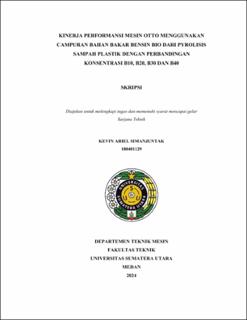| dc.description.abstract | This research identifies the performance of an otto engine that uses a mixture
of plastic waste pyrolysis fuel, mixed with Pertalite in various ratios. The aim of this
research is to evaluate the properties of this biofuel and their impact on engine
performance, including torque, power, specific fuel consumption, thermal efficiency
and exhaust emissions. The plastic waste used includes common types such as
HDPE, LDPE, PET, and PP, and then mixed with Pertalite gasoline in the ratio B0
(100% Pertalite), B10 (10% Plastic Pyrolysis : 90% Pertalite), B20 (20% Plastic
Pyrolysis : 80% Pertalite), B30 (30% Plastic Pyrolysis : 70% Pertalite), and B40
(40% Plastic Pyrolysis : 60% Pertalite). This research uses a Tiger 2880 generator
engine for performance testing, focusing on various parameters such as heating
value, density, viscosity and octane number. Research methods include collecting
plastic waste to be processed, making plastic oil through a pyrolysis process, refining
plastic oil into gasoline, and performance testing on otto engines. The results show
that the biofuel mixture from pyrolysis of plastic waste with pertalite can function as
an alternative fuel, and has the potential to reduce the accumulation of plastic waste
as well as dependence on fossil fuels. This research contributes to developing
sustainable fuel alternatives and highlights the feasibility of recycling plastic waste
into a valuable resource. | en_US |


